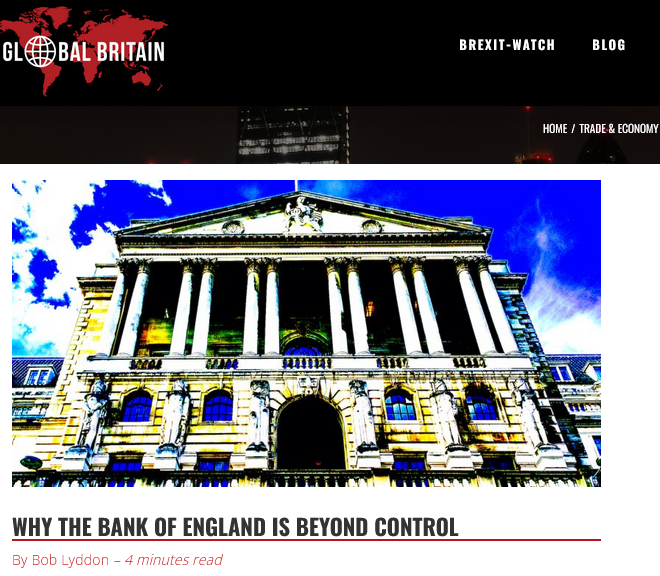Published on 31st January 2023
Global Britain has published a pamphlet written by Lyddon Consulting on how recent events have moved the Bank of England beyond any democratic control. The Bank’s ‘Britcoin’ project – for the introduction of a UK Central Bank Digital Currency – demonstrates the Bank of England independence – from us and from our political representatives.
You can download the pamphlet here: DOWNLOAD PAMPHLET
Introduction
Rishi Sunak and Jeremy Hunt have brought about the complete independence of the Bank of England. The Bank’s status vis a vis Parliament is now the same as the status of the European Central Bank towards European authorities: autonomy.
The Bank’s ‘Britcoin’ project exemplifies this: the introduction of a Central Bank Digital Currency or CBDC. Vested interests dominate it. It draws its evidence from a narrow range of sources. The investigation process is a smokescreen for the Bank to push ahead with major alterations to national life regardless of opposition and events in the real world.
Central banking in a Brexit context
Brexiteers expected the Bank to be reined in after supporting ‘Project Fear’. Instead it has pursued policies, like Quantitative Easing (QE) and ultra-low interest rates, in lock step with other central banks.
Its reference points are international: the Federal Reserve Bank, the European Central Bank, the World Bank, the International Monetary Fund, the Bank for International Settlements etc..
These bodies – and their fellow travellers in the payment card eco-systems, management consultancies, and trade bodies for the financial technology and cryptocurrency industries – have opined positively on CBDCs. The Bank can present its own enthusiasm for Britcoin as market-based and demand-driven.
Vested interests and poor governance of the Britcoin CDBC project
Lyddon Consulting’s recent paper demonstrates the dominance of vested interests and the numerous governance shortfalls: ‘CAPTURE – BigTech and Digital Payment Giants dominate the committees evaluating the replacement of physical cash with ‘Britcoin’ – a UK ‘Central Bank Digital Currency’’.[1]
The Bank is allowing the project to be front-run[2] by a ‘concert party’[3] of organizations who will benefit financially from its going ahead.
Independent or out-of-control?
No-one can now rein the Bank in. Sunak and Hunt recently bowed to the Bank’s opposition on the issue of ‘calling-in powers’.[4] The Bank can debit its losses on QE to the taxpayer.[5]
Hunt, in his Autumn Statement, endorsed the narrative around the Mini-Budget on 23rd September that defenestrated Truss and Kwarteng and elevated Sunak and himself. He exculpated the Bank from blame for inflation by quoting the Office for Budget Responsibility that ‘global factors are the primary cause of current inflation’.
He abdicated his responsibilities as the representative of Parliament and the voters in limiting the Bank’s powers. The Bank now has ‘carte blanche’ within its remit, which is itself elastic.
‘Financial stability’ – the flexible friend of the Bank in justifying its espousal of Britcoin and cryptoassets
‘Stability’ being the lead issue in the Autumn Statement, Sir Jon Cunliffe – the Bank’s Deputy Governor for Financial Stability – can accelerate the regulation of cryptoassets because of the collapses in the cryptocurrency market (such as of FTX[6] and BlockFi[7])[8], so as to make the UK a global cryptoasset hub.[9]
Sir Jon’s position mirrors that of the European Central Bank, that a digital euro is needed for financial stability in a digital world.[10] Both the Bank of England and the European Central Bank are free to pursue such self-serving and counter-intuitive delusions.
Sunak and Hunt have entered into a Devil’s Pact with the Bank – its price is the death of democracy
Sunak and Hunt have surrendered responsibility over the country’s money not just for themselves as politicians, but on behalf of all of the UK’s individuals and businesses. The Bank can create debts for which all the UK’s individuals and businesses are responsible – like the extra £133 billion of borrowings needed to cover its QE losses – without having to give good account of itself to taxpayers.
The Bank can do anything it wishes in the name of ‘financial stability’: the Britcoin project is a token of its autonomy from the views of the UK government, of UK businesses and individuals, and from external reality.
Conclusion
Political appointees have abdicated responsibility for managing the UK’s money: this means that we have no control of the money we use or the debts that can be created for which we are responsible.
[1] http://www.lyddonconsulting.com/capture-a-major-new-paper-on-the-committees-considering-a-uk-central-bank-digital-currency/ accessed on 12 November 2022
[2] ‘Front-running’: https://www.investopedia.com/terms/f/frontrunning.asp accessed on 8 December 2022
[3] ‘Concert party’: phrase used in the financial world for a group of ostensibly autonomous market actors who have entered into an agreement to behave in the same way to their collective advantage, for example by supporting a new issue of shares
[4] https://www.cityam.com/sunak-backs-down-against-boe-and-ditches-call-in-power-over-city-regulators/ accessed on 29 November 2022
[5] https://www.reuters.com/world/uk/uk-taxpayers-hook-133-billion-pound-bill-cover-boe-losses-2022-11-17/ accessed on 18 November 2022
[6] https://fortune.com/crypto/2022/11/13/could-sam-bankman-fried-go-to-prison-for-the-ftx-disaster/ accessed on 14 November 2022
[7] https://www.reuters.com/technology/crypto-lender-blockfi-files-bankruptcy-protection-2022-11-28/ accessed on 29 November 2022
[8] https://www.coindesk.com/policy/2022/11/21/uk-may-need-digital-pound-bank-of-englands-jon-cunliffe-says/ accessed on 29 November 2022
[9] https://www.gov.uk/government/news/government-sets-out-plan-to-make-uk-a-global-cryptoasset-technology-hub accessed on 12 November 2022
[10] https://www.ecb.europa.eu/paym/digital_euro/html/index.en.html accessed on 15 November 2022

